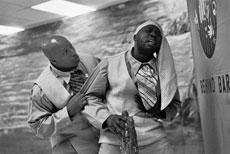“Murderers, fugitives, thieves … Shakespeare would have loved these guys,” reads a poster in the alleyway next to the entrance to Coolidge Corner Theater. The poster shows a prison yard, an ominous barbed wire fence, and a guard tower in the background. In the foreground there are the legs of two prisoners facing each other.
The poster advertises the new documentary by Hank Rogerson and Jilann Spitzmiller, Shakespeare Behind Bars, which is playing in an exclusive engagement at Coolidge Corner Theater. The film follows prisoners at the Luther Luckett Correctional Complex in La Grange, Kentucky as they prepare to perform Shakespeare’s final play The Tempest.
In its 7th year, the Shakespeare Behind Bars program is part of the rehabilitation of a select group of inmates at Luckett. Each year a different Shakespearean play is chosen, inmates are chosen for the roles, they rehearse, and then they perform the play for fellow inmates and guests. Volunteer director Curt Tofteland chose to perform The Tempest because of its relevance to the prisoners and their lives behind bars.
“The play takes place on an island and prison is like an island. There are people on the island that have power and there are people in prison who have power,” he says in explaining his choice. The same concepts, forgiveness, revenge, abandonment, that Shakespeare masterfully weaved through the play when he wrote it nearly four hundred years ago are intertwined throughout the film.
The film is less about a group of hard-nosed criminals putting on a Shakespearean play and more about the inmates themselves. It focuses more on the decisions of these men and the consequences of their lives behind bars than on the circumstances and complications of performing The Tempest in a medium security prison. A number of long time participants in the program would be up for parole soon after the play is performed and it could possibly be their final play, Tofteland felt that the choice of Shakespeare’s final play should appropriately be their final play as well.
“The rarer action is in virtue than in vengeance,” a line spoken by Prospero, the protagonist of Shakespeare’s play, has new significance when spoken by a man who is serving 12 years for killing his wife by dropping a hair dryer into her bath. Men who have committed heinous crimes, murder, armed robbery, drug dealing, child molestation, put every last ounce of themselves into their performance.
The viewer follows them for nine months as they put their hearts and souls into the world of Shakespeare, something it can be hard to picture most inmates doing. They rehearse lines with each other constantly, in the yard, while folding laundry, in the locker room of the gym, even while serving time in solitary confinement. As these men slowly grow into their roles, they learn more about themselves than they ever thought they would, growing as actors at the same time the are growing as men.
Putting on a play that stars inmates of a medium security prison is not an easy task. The director is destined to loose a few cast members along the way. Men get parole, men are sent to solitary, men lose interest in the play, any number of things can happen to alter the schedule of production. Despite the difficulties that may arise, these prisoners are determined to make the performance a memorable one-that the Bard himself would approve of.
Whether they succeed in this or not makes no difference. The difference is found in the transformations these men undergo, the changes the play forces upon them. It is always comforting to know that men like these ones are safely locked away behind bars, it is more comforting to know that there is some amount of humanity still left in them. Like the deformed Caliban in the play, these men are more human than we often allow ourselves to see. For anyone who loves Shakespeare, anyone who is interested in psychology and justice, for anyone with a heart, this compelling, many times heartbreaking, film is a definite must see.

